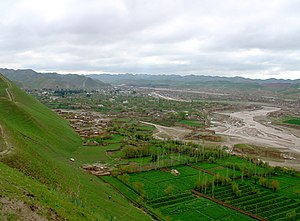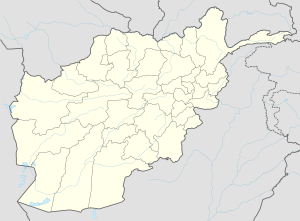Qala e Naw
Qala-e-Naw
قلعه نو | |
|---|---|
Town | |
 Approach to Qala-e-Naw | |
| Coordinates: 34°59′12″N 63°7′45″E / 34.98667°N 63.12917°E | |
| Country | |
| Province | Badghis |
| District | Qala-e-Naw |
| Government | |
| • Mayor | Abdul Qadir Kamran |
| Elevation | 967 m (3,173 ft) |
| Population (2015) | |
• Town | 64,125 [1] |
| • Urban | 64,125 [2] |
| Time zone | UTC+4:30 |
| Website | www.naraiman.com |
Qala-e-Naw (Dari: قلعه نو) is a town in Qala-e-Naw district and the capital of Badghis province, in north-west Afghanistan. Its population was estimated at 9,000 in 2006, of which most were Sunni Hazaras. Other significant communities include Tajiks, Pashtuns, Balochs, and Uzbeks.[3]
The city of Qala-e-Naw has a population of 64,125 people (2015)[4] with 6 Police districts (nahias) and a total land area of 3,752 Hectares.[5] There are 7,125 total number of dwellings in Qala-e-Naw.[6] Qala-e-naw is the provincial capital of Badghis Province.
Qala-e-Naw is a Provincial Centre located in western Afghanistan north of the Paropamisus Mountains (Selseleh-ye Safīd Kūh). Barren land accounts for 49% of the total land area[7] and only 28% is classified as built-up.[8] Of the built-up land, 60% is residential.[9] District 4 has a large institutional and transportation land use as a result of the airport located there.[10]
It has a small airport, Qala i Naw Airport.
On 7 July 2021, the Taliban began an assault on the town[11] which culminated in defeat by Afghan forces. 69 Taliban fighters were killed, and 23 were injured.[12] The city was captured by the Taliban on 12 August 2021, around the same time as the fall of Herat, becoming the thirteenth provincial capital to be seized as part of the wider 2021 Taliban offensive.[13][14]
Climate
[edit]Qala i Naw has a mediterranean climate (Köppen climate classification Csa), with hot summers and cold winters. Precipitation mostly falls in winter and early spring. Snow is common in winter.
| Climate data for Qala e Naw | |||||||||||||
|---|---|---|---|---|---|---|---|---|---|---|---|---|---|
| Month | Jan | Feb | Mar | Apr | May | Jun | Jul | Aug | Sep | Oct | Nov | Dec | Year |
| Record high °C (°F) | 23.2 (73.8) |
25.4 (77.7) |
32.7 (90.9) |
33.5 (92.3) |
39.1 (102.4) |
42.5 (108.5) |
42.8 (109.0) |
40.0 (104.0) |
37.7 (99.9) |
35.0 (95.0) |
30.5 (86.9) |
26.5 (79.7) |
42.8 (109.0) |
| Mean daily maximum °C (°F) | 6.3 (43.3) |
7.4 (45.3) |
14.9 (58.8) |
21.9 (71.4) |
29.0 (84.2) |
33.7 (92.7) |
35.8 (96.4) |
33.5 (92.3) |
29.0 (84.2) |
23.0 (73.4) |
16.7 (62.1) |
10.2 (50.4) |
21.8 (71.2) |
| Daily mean °C (°F) | 0.1 (32.2) |
2.4 (36.3) |
3.6 (38.5) |
15.1 (59.2) |
20.8 (69.4) |
25.8 (78.4) |
28.2 (82.8) |
25.3 (77.5) |
20.5 (68.9) |
14.0 (57.2) |
8.6 (47.5) |
3.9 (39.0) |
14.0 (57.2) |
| Mean daily minimum °C (°F) | −4.0 (24.8) |
−2.4 (27.7) |
2.9 (37.2) |
8.9 (48.0) |
12.0 (53.6) |
15.8 (60.4) |
18.2 (64.8) |
16.1 (61.0) |
10.0 (50.0) |
5.0 (41.0) |
1.8 (35.2) |
−0.8 (30.6) |
7.0 (44.5) |
| Record low °C (°F) | −27.3 (−17.1) |
−26.1 (−15.0) |
−10.9 (12.4) |
−9.0 (15.8) |
2.3 (36.1) |
6.6 (43.9) |
11.2 (52.2) |
6.3 (43.3) |
0.2 (32.4) |
−7.0 (19.4) |
−9.6 (14.7) |
−23.4 (−10.1) |
−27.3 (−17.1) |
| Average precipitation mm (inches) | 63.9 (2.52) |
77.0 (3.03) |
97.5 (3.84) |
47.3 (1.86) |
12.3 (0.48) |
0.0 (0.0) |
0.0 (0.0) |
0.0 (0.0) |
0.6 (0.02) |
6.7 (0.26) |
17.9 (0.70) |
53.4 (2.10) |
376.6 (14.81) |
| Average rainy days | 5 | 7 | 10 | 9 | 3 | 0 | 0 | 0 | 0 | 2 | 4 | 5 | 45 |
| Average snowy days | 6 | 5 | 3 | 0 | 0 | 0 | 0 | 0 | 0 | 0 | 1 | 3 | 18 |
| Average relative humidity (%) | 78 | 75 | 75 | 70 | 53 | 39 | 37 | 37 | 43 | 53 | 60 | 76 | 58 |
| Mean monthly sunshine hours | 127.4 | 120.8 | 170.9 | 162.5 | 264.0 | 344.8 | 367.2 | 334.0 | 310.8 | 197.0 | 175.4 | 110.2 | 2,685 |
| Source: NOAA (1970–1983) [15] | |||||||||||||
References
[edit]- ^ "The State of Afghan Cities Report 2015". Archived from the original on 31 October 2015. Retrieved 21 October 2015.
- ^ "The State of Afghan Cities Report 2015". Archived from the original on 31 October 2015. Retrieved 21 October 2015.
- ^ World Gazetteer: Qalʿeh-ye Naw - profile of geographical entity including name variants Archived October 1, 2007, at the Wayback Machine
- ^ "The State of Afghan Cities Report 2015". Archived from the original on 31 October 2015. Retrieved 21 October 2015.
- ^ "The State of Afghan Cities Report 2015". Archived from the original on 31 October 2015. Retrieved 20 October 2015.
- ^ "The State of Afghan Cities Report 2015". Archived from the original on 31 October 2015. Retrieved 20 October 2015.
- ^ "The State of Afghan Cities Report 2015". Archived from the original on 31 October 2015. Retrieved 20 October 2015.
- ^ "The State of Afghan Cities Report 2015". Archived from the original on 31 October 2015. Retrieved 20 October 2015.
- ^ "The State of Afghan Cities Report 2015". Archived from the original on 31 October 2015. Retrieved 20 October 2015.
- ^ "The State of Afghan Cities Report 2015". Archived from the original on 31 October 2015. Retrieved 20 October 2015.
- ^ "Taliban battle their way into western Afghan city". BBC News. 7 July 2021. Retrieved 7 July 2021.
- ^ "69 Taliban terrorists killed, 23 injured as Afghan forces regain control of Qala-e-Naw city - Times of India". The Times of India. 8 July 2021. Retrieved 9 July 2021.
- ^ "Afghanistan: Major cities fall to Taliban amid heavy fighting". BBC News. 12 August 2021.
- ^ Sharif, Hussein (12 August 2021). "Afghanistan Collapse Accelerates as 2 Vital Cities Near Fall to Taliban". The New York Times. Retrieved 12 August 2021.
- ^ "Qalai naw Climate Normals 1970-1983". National Oceanic and Atmospheric Administration. Archived from the original on 2023-05-04. Retrieved December 25, 2012.


